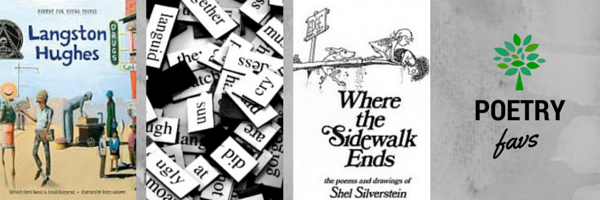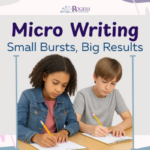 It’s April. That means it’s time to open the door to the most feared and cherished of genres – POETRY! I wish that classrooms focused on poetry year round because of all that it can offer a language classroom, but I also know why it’s often avoided.
It’s April. That means it’s time to open the door to the most feared and cherished of genres – POETRY! I wish that classrooms focused on poetry year round because of all that it can offer a language classroom, but I also know why it’s often avoided.
When I was in school, I had that teacher. Yes, that teacher who made me groan as she announced it was time for a poem. Immediately I would slouch and almost shut down, knowing I would never understand the poem the way she did. I wasn’t the only student in her class who reacted that way. With the exception of a few “gifted” kids, the whole class had a look of either fear or frustration. We knew, even as students, that the next few days would be spent destroying this poem, line by painful line. Years later, the cycle continues as those scarred students are now responsible for teaching language and we seem to intentionally skip over poetry or limit it to the month of April.
I am asking you to now shake it off (Taylor Swift style). For the sake of the students in your class, separate the past, and be a “poetry provider.” Poetry offers so much for students. Every single standard that you are responsible for teaching can be found in a poem. Sensory language, visualization, making inferences, making connections…the list goes on!
The beauty in teaching all these things through poetry is that poems tend to be shorter, which makes them easy to reread in order to grasp the desired concept as fully as possible. Rereading a text multiple times is beneficial because it helps students:
- increase fluency and knowledge of sight words.
- learn and practice new strategies with each read.
- identify main ideas and vocabulary.
- develop meaningful phrasing.
Poetry, especially for middle school students, can also be an avenue of expression. When students value the power of the pen from a poet, they begin to understand how to share their own feelings. Poetry can be mentor texts that helps students write metaphors of their own lives, create visuals of events that shape how they feel or who they are, or to create an image that expresses their desires or dreams.
As a former poetry hater, I can assure you that I have been transformed into a poetry provider by bringing joy into the teaching of this spectacular genre. As a teacher, I like to introduce various types of poems – lyric poems, narrative poems, free-verse, etc. – hoping that all my students can find a “brand” of poetry that they can enjoy. To one student that enjoyment might be the language or words, another might find interest in the structure of the poem, yet another might connect with the theme. Regardless of the element with which they connect, the student is enjoying the poem and I celebrate that with open discussion and reflection. On following days, we discuss the standards that need to be taught. In the end, the students’ understanding of and insight into the poem are valued and expressed openly.
Here are some sites to get you started:
- National Poetry Month
- Poetry Out Loud
- Classroom Poetry Slams
- Blackout Poetry – Austin Kleon
- Types of Poetry
If you are interested in learning how to make poetry enjoyable (not painful!) in your classroom, please see workshop descriptions here.
What is your favorite poem to teach?




Really excited to do poetry. Have found a ton of great resources!